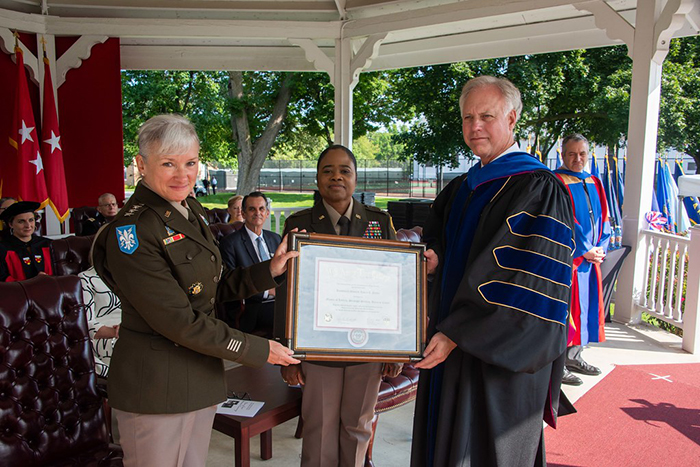Dickinson College Alumna Delivers USAWC Commencement Address

Lt. Gen. Laura Potter (left) accepts an honorary degree from the USAWC. Also pictured: Brig. Gen. Janeen Brickhead (center) and James Breckenridge, USAWC provost. Photo courtesy of the USAWC Photo Lab.
Grads urged to think critically, lead strategically
by MaryAlice Bitts-Jackson
Speaking at the U.S. Army War College (USAWC) bandstand in Carlisle, Pennsylvania, Friday morning, Lt. Gen. Laura Anibal Potter ’89 assessed the unique challenges of the current moment and the skills and mindset needed to tackle the good work ahead.
Potter, who studied Russian and Spanish at Dickinson, is one of few women generals in the U.S. Army and the first woman Dickinson ROTC graduate to earn that rank. She now serves as Army deputy chief of staff of intelligence, following her tenure as director of intelligence of the J-2 U.S. European Command.
Last week, Potter visited the Army’s premier institution for strategic leadership training to deliver the USAWC’s 2021 Commencement address and accept an honorary master of letters in strategic studies.
“We face a strategic environment that is more complex now than at any time during my 32 years of wearing this uniform,” Potter told the audience of USAWC faculty and leaders, graduates, their families and distinguished guests. “The USAWC is designed to help our nation educate and adapt strategic thinkers, always ready to meet every challenge, and that doesn’t happen by chance. It requires institutions like this that are devoted to training strategic leaders … and individuals driven to drive change and committed to answering our nation’s call.”
Dickinson has long partnered with the USAWC on initiatives that aim to help prepare students for leadership in global policy, foreign affairs, security and intelligence, including Dickinson’s new master’s program in managing complex disasters. Potter’s keynote address, delivered just a few months after she discussed military and intelligence careers with Dickinson ROTC students via Zoom, underscores the distinctive ties between the two institutions and the common educational priorities they share.
Speaking with officer and civilian graduates from across the nation and around the world, Potter urged these global leaders to think critically, to lead by example and to understand complex issues from varying viewpoints so they can work collaboratively across sectors, cultures and nations. She also pointed to the need to adapt to rapid technological and environmental changes and to promote diversity, adaptability and critical thinking.
“When you began two years ago, no one could have imagined the personal, professional and national challenges [you’d encounter],” Potter said, referring to the global pandemic and the nation’s related efforts of the past year that many of the graduates helped to advance while also completing the USAWC’s two-year program. “You faced personal, professional and national challenges head-on.”
“And there’s so much more to do,” she continued, “but you are very well-equipped. When each of you leave here, you will not just respond to change. You will drive transformation.”
TAKE THE NEXT STEPS
Published July 27, 2021